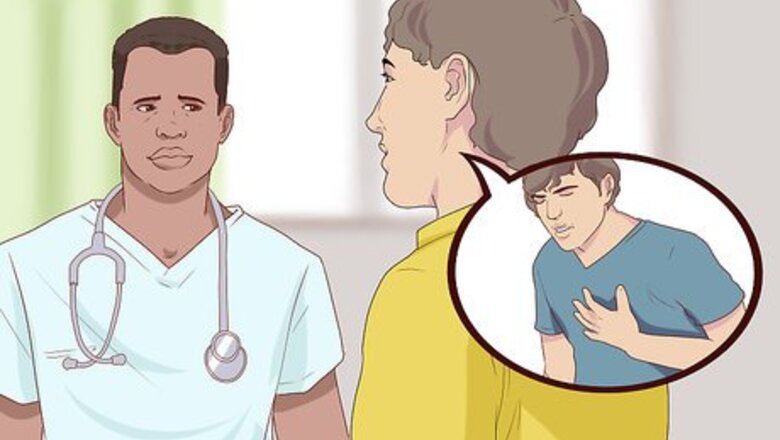
views
X
Trustworthy Source
Mayo Clinic
Educational website from one of the world's leading hospitals
Go to source
There are several types of Castleman disease, and the appropriate treatment depends on which variety you have. If you suspect you have Castleman disease, see your doctor to get a specific diagnosis. Work closely with your medical team to determine the best treatment for you. If you need extra support, reach out to research organizations that study Castleman disease, connect with other patients, and seek comfort from your family and friends.
Determining the Right Treatment
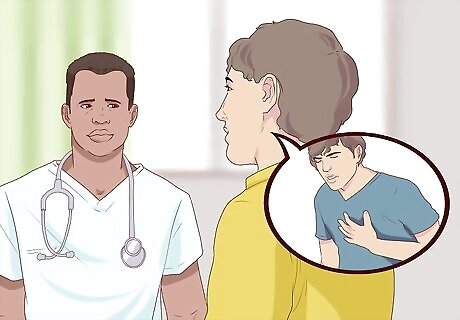
See your doctor if you have symptoms of Castleman disease. Many patients with Castleman disease don't experience any symptoms. You might not realize you have it unless your doctor notices an enlarged lymph node during a routine exam or an imaging test. However, make an appointment with your doctor right away if you notice symptoms such as: Enlarged lymph nodes in your neck, collarbone, underarms, or groin A fever Weight loss with no obvious cause (i.e., you have not changed your diet or exercise habits) Fatigue Nausea Night sweats Symptoms of an enlarged liver or spleen, such as swelling, pain, or fullness in your abdomen
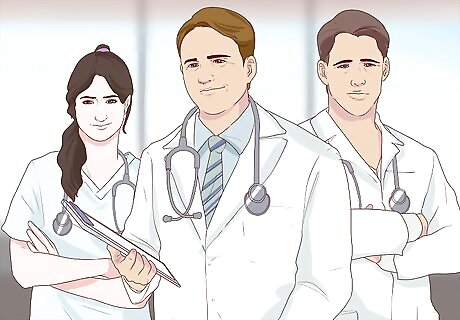
Find a doctor who specializes in Castleman disease. Castleman disease is typically treated by hematologists (experts in blood and immune system diseases), surgeons, or oncologists (doctors who treat cancer and related conditions). Since CD is rare, your doctor may not be experienced in treating it. If your doctor suspects you have Castleman disease, they will likely refer you to a specialist for further testing and treatment. If your doctor can't recommend any specialists in your area, reach out to the Castleman Disease Collaborative Network (CDCN) at CDCN.org to help located your closest Castleman disease expert. A specialist can run tests to determine exactly which type of Castleman disease you have, and recommend an appropriate treatment based on your diagnosis.
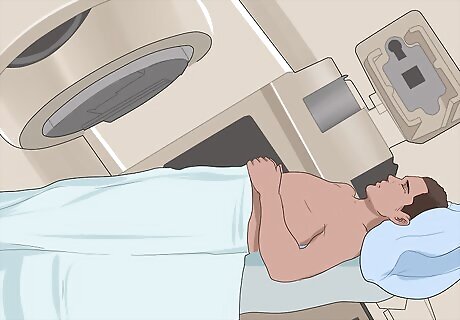
Undergo diagnostic tests to determine what type of CD you have. There are a number of tests your doctor may administer to determine the exact type of CD that you have. This will help your doctor decide which type of treatment is right for you. Typical tests for CD include: The Types of Castleman Disease Unicentric Castleman Disease: This is the most common type. In UCD, a single lymph node is enlarged, usually in the chest or abdomen. Multicentric Castleman Disease: This form of CD affects multiple lymph nodes throughout the body. It is typically associated with a viral infection such as HHV-8 or HIV, but can also occur with no known cause (idiopathic multicentric Castleman disease). Blood and urine tests: Your doctor will take samples of your blood or urine to test for anemia and certain protein abnormalities that are associated with CD. These tests can also help rule out other causes for your symptoms, such as an infection. Imaging tests: Your medical team will use imaging tools including CT scans, PET scans, MRI scans, or ultrasound to look for growths on your lymph nodes and identify where the affected nodes are located. Lymph node biopsy: Through a minimally invasive surgery, your doctor will extract a sample of the affected tissue and study it. This may help them identify the subtype of your CD or rule out other conditions that affect the lymph nodes, such as lymphoma.
Ask the doctor questions. Your doctor and the rest of your care team will likely want to interview your about your symptoms and your health history. This is also a good time for you to ask your own questions or raise any concerns you have about your treatment. Some good questions to ask your doctor include: Have you ever treated this disease before? If not, can you refer me to a doctor who has? What types of tests are you going to need to do? How can I prepare for the tests? Was my biopsy reviewed by a pathologist who has experience with CD? What subtype of Castleman disease do I have? What other diagnoses did you consider and rule out? What kinds of treatment do you recommend for my condition? What are the risks? When do I need to start treatment? How long will treatment last? Do I qualify for any current clinical trials? Will I need to undergo follow-up care after treatment?
Receiving Treatment
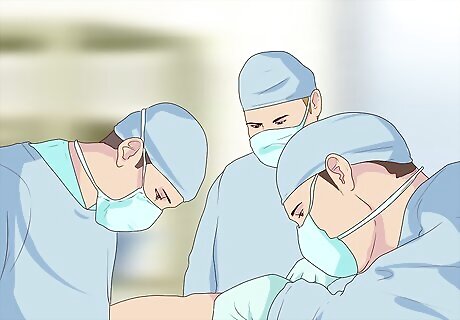
Get surgical treatment for UCD (unicentric Castleman disease). If you have UCD, ask your doctor for a referral to a surgeon who can surgically remove the enlarged lymph node. Surgical removal is the treatment of choice for UCD and has excellent results. Symptoms commonly resolve after surgery and recurrence is rare. The severity of the surgery depends on where the affected lymph node is located. Some patients are able to go home after the surgery while others, especially those whose affected nodes are deep in the chest, may have to remain in the hospital for several days. Follow your surgeon's advice before and after the procedure. Some questions you may want to ask your surgeon before the surgery include: "How long will I have to remain in the hospital?" "What will I have to do after the surgery to recover?" "Am I at risk for any side effects during this surgery?" "Should I discontinue taking any medications before I go in?"
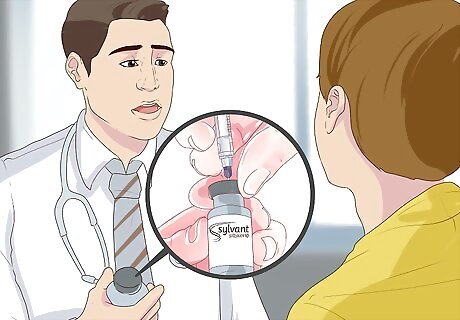
Take medications to treat MCD (multicentric Castleman disease). If you have HHV-8-associated MCD or idiopathic MCD, talk to your doctor about treating your CD with medications. They may recommend a combination of corticosteroids, immunotherapy drugs, and antiviral medications to treat your condition. Depending on how severe your disease is (which your doctor will determine based on your symptoms, exam, and laboratory testing), you may need to be admitted to a hospital for monitoring, further evaluation, and treatment. Common medical treatments include: Did you know? MCD is often associated with Human Herpesvirus 8 (HHV-8), which can also cause a rare cancer called Kaposi sarcoma. Kaposi sarcoma and MCD may occur together. Siltuximab (Sylvant). This is a manmade antibody that is designed to attack abnormal proteins associated with idiopathic MCD. Side effects include constipation, headaches, weight gain, and throat, mouth, or stomach pain. If you develop a rash or infection while on siltuximab, contact your doctor immediately. Rituximab (Rituxan). This immunotherapy drug is the treatment of choice for HHV-8-associated MCD. Common side effects include chills, fever, or other cold-like symptoms. If you become confused, dizzy, or weak on one side of your body, contact your doctor immediately. Corticosteroids. These are commonly used in conjunction with other medications to treat MCD. Your doctor may either inject them or they may give you a pill, like Prednisone, to take. Side effects may include increased blood sugar, mood swings, infection, weakened bones, fatigue, muscle weakness, weight gain, fluid retention, and high blood pressure. Antiviral medications. These may be used to manage underlying viral infections that can contribute to MCD, such as HHV-8 or HIV.
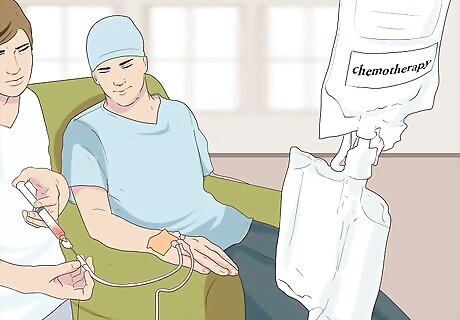
Look into chemotherapy for hard-to-treat MCD. For severe cases of MCD that do not respond to other treatments, you may have to undergo chemotherapy. The treatments for MCD are very similar to those for lymphoma. Your doctor will most likely recommend a combination of chemotherapy drugs, given to you either as a pill or by injection. You may cycle through weeks of chemotherapy followed by a few weeks of rest. Chemotherapy can cause a wide range of side effects, including hair loss, mouth sores, loss of appetite, nausea, vomiting, diarrhea, infection, fatigue, and weakness. It may also make you more susceptible to bruising or bleeding. Let your medical team know about your symptoms, and they will prescribe ways to manage them. Chemotherapy may be most effective if it is combined with other treatments, such as corticosteroids or radiation therapy.
Finding Support and Other Treatment Options
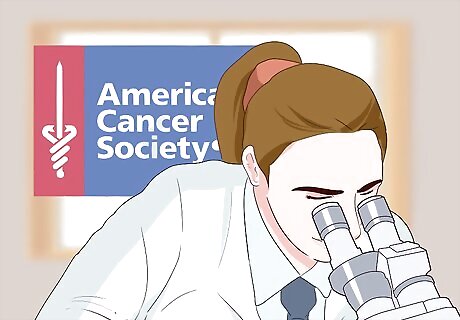
Find support groups and research organizations. National support groups and organizations help provide emotional support as well as information about new research and treatments. While CD is rare, there are active networks that can help put you in touch with others suffering from the same disease. Do an online search or ask your doctor to recommend research organizations and support groups that might be helpful to you. The Castleman Disease Collaborative Network maintains an active community of researchers, family, and people with CD. They also provide updates on recent research into the disease. RareConnect maintains an international, online support group for those with CD, which you can visit here: https://www.rareconnect.org/en/community/castleman-disease.
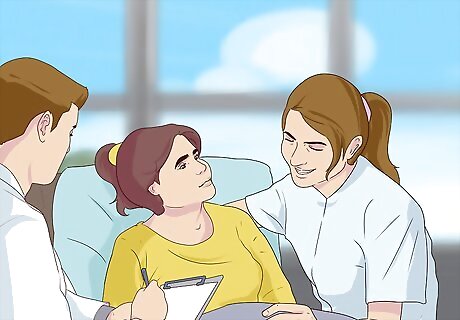
Join a clinical trial. Because CD is so rare, patient involvement in research studies in incredibly important for learning about the disease and developing new treatments. Research involvement can be as simple as answering a few questions and signing a consent form so that your medical records can be used for research. You can also donate blood, saliva, and lymph node samples. Lastly, you could volunteer to participate in a trial of an experimental medication. The Castleman Disease Collaborative Network (CDCN) organizes research trials in Castleman disease and can coordinate your involvement in research projects. The U.S. National Institute of Health keeps a database of clinical trials for CD that are currently active, recruiting, or completed. For more information, visit https://www.clinicaltrials.gov and search for “Castleman disease.” The CDCN maintains a database of people with CD to aid researchers. By adding your information and pathology report to the ACCELERATE Patient Registry, you can contribute to research for treatments. Add yourself to the registry here: https://cdcn.pulseinfoframe.com/portal/register.
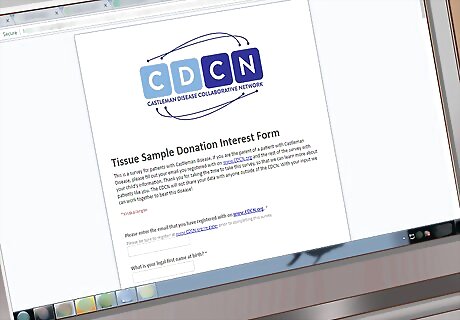
Donate your tissue to research. Another way to contribute to new research is to donate your affected tissue after a biopsy or surgery. The CDCN currently manages collections of tissue for research. To see if you qualify, you can fill out a form on their website here: https://docs.google.com/forms/d/e/1FAIpQLSd5iOLcHqaKdjijdV4pY6WALFdHVWJUkQnJ2Z0ZD8nnYOjOLw/viewform. Tip: Ask your doctor if you can donate tissue that is removed during a biopsy or surgical treatment for research purposes. They may ask you to sign a consent form or to specify exactly how you want the samples to be used.

Confide in your family and friends. Your personal support network will be invaluable in helping you remain strong and healthy during this time. If you are feeling upset, scared, or nervous, find someone you trust to talk to about these problems. If you don't have someone close to you for support, you can still reach out to others. Places of worship can coordinate someone to help you with daily tasks if needed. Schools and universities may be able to provide accommodation. Your coworkers may be willing to pick up slack around the office. Depending on the severity of your disease, you may need someone to give you rides to appointments, treatments, and possibly the hospital. Make sure you have 1 or 2 people who can commit to taking you. If you are feeling depressed, hopeless, or anxious, you may want to contact a licensed therapist.



















Comments
0 comment